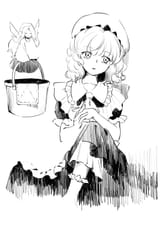Search Results
6/26/2025, 2:44:37 AM
>>49621238
Well, that's what you get out of it, so why not. It's entirely subjective, though, and should only be treated as such. Like, sure, it's a mystery to you, and you enjoy solving it, but to me, it's the impression of a mystery, and I see it as a kind of dream sequence. Some third reader/listener might see it in some third way, and we'll both find it pretty lame, I'm willing to bet, and we'll have no problem stating it openly, but that person will be making the most of it within that third paradigm of thought, and that paradigm is equal to any other.
>Otherwise, we have very little to anchor the discussion and it just devolves in "I feel X about the story", "well, I feel Y about the story". Of course, it isn't a perfect method, but it at least gives all the members of the conversation the common goal of approximating the original meaning of each detail. Talking about just how it makes you feel a priori adds to the conversation, but it can't work by itself.
Well, why can't it? It's pretty fun to share ideas, it helps you expand and refine your own, if anything. There's really no need to have this one specific common goal of approxmating the original meaning as opposed any other goal. No method will be objectively superior, because it depends entirely on your goal, and different readers' goals can be different.
Do you think that putting less value on authoral intent means willful ignorance or something like that? It's not like things like ZUN's outside influences are going to be ignored on principle with a less systematic approach. It simply doesn't put authoral intent above anyone else's, which, well, it really isn't, because it's all fiction, and no part of it is more or less real just on the basis of who's imagining it. Birth of the reader and all.
Basically 1) All interpretations (among with the author's) are equal unless you set out to uphold a specific one artificially 2) That equality doesn't make them all equally appealing to any given reader 3) Expressing that an interpretation is unappealing doesn't make it "untrue". Cause I'm kind of rambling... so, to put it consicely
>You can't make a painting only with negative space.
By the way, you can. I get what you're trying to say, but you very much can. That's way beside the point though, haha, I don't really mean it as a continuation of the argument.
Well, that's what you get out of it, so why not. It's entirely subjective, though, and should only be treated as such. Like, sure, it's a mystery to you, and you enjoy solving it, but to me, it's the impression of a mystery, and I see it as a kind of dream sequence. Some third reader/listener might see it in some third way, and we'll both find it pretty lame, I'm willing to bet, and we'll have no problem stating it openly, but that person will be making the most of it within that third paradigm of thought, and that paradigm is equal to any other.
>Otherwise, we have very little to anchor the discussion and it just devolves in "I feel X about the story", "well, I feel Y about the story". Of course, it isn't a perfect method, but it at least gives all the members of the conversation the common goal of approximating the original meaning of each detail. Talking about just how it makes you feel a priori adds to the conversation, but it can't work by itself.
Well, why can't it? It's pretty fun to share ideas, it helps you expand and refine your own, if anything. There's really no need to have this one specific common goal of approxmating the original meaning as opposed any other goal. No method will be objectively superior, because it depends entirely on your goal, and different readers' goals can be different.
Do you think that putting less value on authoral intent means willful ignorance or something like that? It's not like things like ZUN's outside influences are going to be ignored on principle with a less systematic approach. It simply doesn't put authoral intent above anyone else's, which, well, it really isn't, because it's all fiction, and no part of it is more or less real just on the basis of who's imagining it. Birth of the reader and all.
Basically 1) All interpretations (among with the author's) are equal unless you set out to uphold a specific one artificially 2) That equality doesn't make them all equally appealing to any given reader 3) Expressing that an interpretation is unappealing doesn't make it "untrue". Cause I'm kind of rambling... so, to put it consicely
>You can't make a painting only with negative space.
By the way, you can. I get what you're trying to say, but you very much can. That's way beside the point though, haha, I don't really mean it as a continuation of the argument.
Page 1
